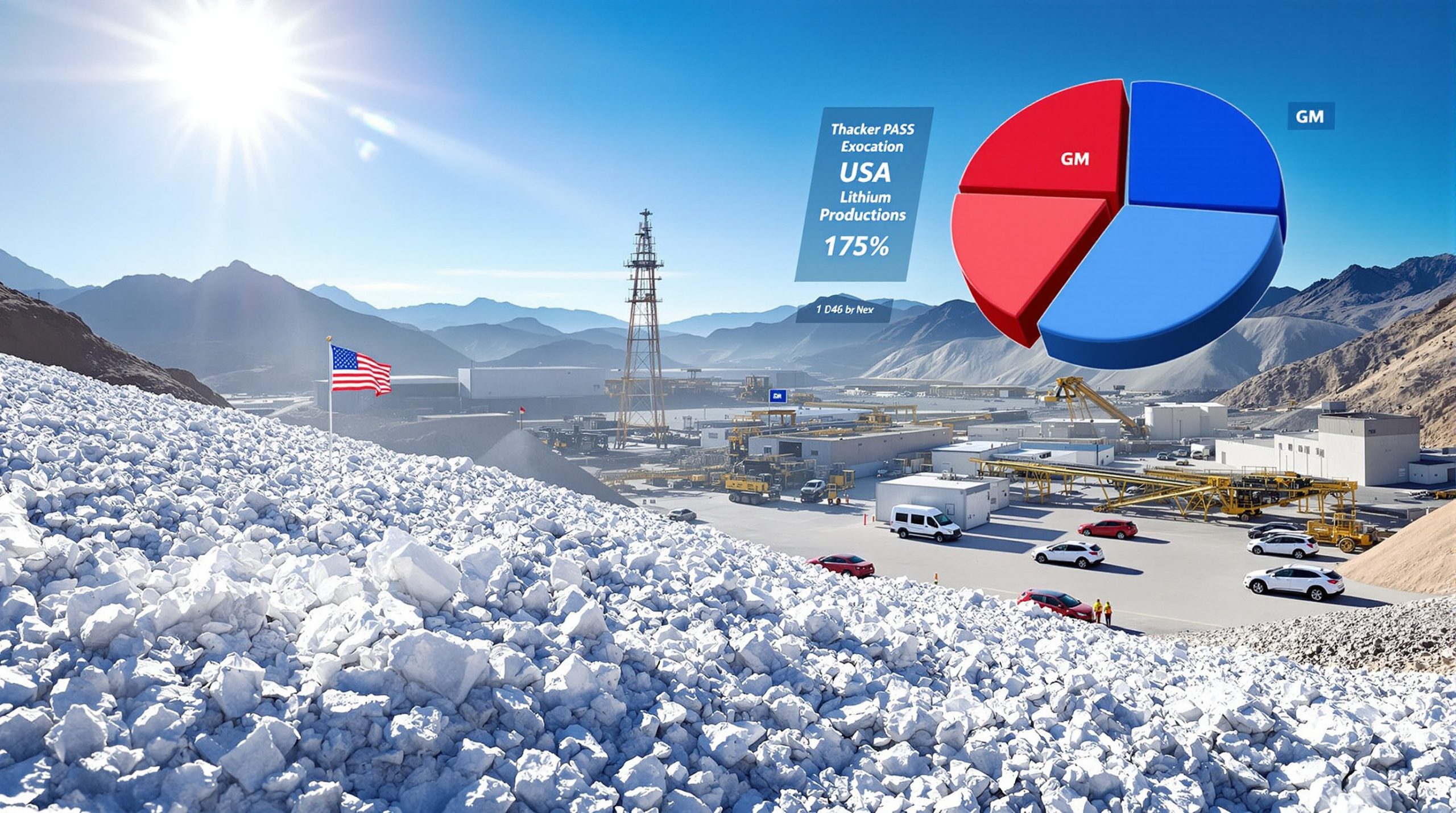Congo Court Ruling: How Legal Battles Impact Global Critical Mineral Goals
The Democratic Republic of Congo (DRC) sits at the center of a complex web of legal battles, international sanctions, and strategic interests that could reshape global critical mineral supply chains. A recent court ruling has intensified competition for one of the world's richest tantalum deposits, potentially complicating efforts to secure ethical sources of minerals essential for high-tech industries and critical minerals energy security.
The Strategic Importance of Rubaya's Tantalum Deposits
The hills surrounding Rubaya contain exceptionally valuable tantalum-bearing coltan ore, making this region a focal point for mining interests despite being currently controlled by rebel forces. Tantalum, though a relatively small market at approximately 2,500 tons annually, plays a crucial role in electronics, aerospace, and defense industries.
According to geological assessments, the DRC and neighboring Rwanda together produce nearly 60% of global tantalum output, highlighting the region's strategic importance for technology supply chains.
What's Behind the Controversial Court Decision?
The Legal Battle Over Mining Rights
At the heart of the dispute is a September 2025 ruling by Congo's top administrative court that strengthens the claim of Congo Fair Mining (CFM) to the prized Rubaya mining concession. This decision comes despite CFM's parent company, Cooperative des Artisanaux Miniers du Congo (CDMC), being under U.S. sanctions.
The court canceled or suspended three ministerial decrees that had previously separated the valuable Rubaya concession from a larger surrounding license now held by CFM. This legal victory directly challenges the Congolese government's position that state-owned Societe Aurifere du Kivu et du Maniema SA (SAKIMA) is the rightful owner of the mining rights.
Sanctions and Allegations
The U.S. Treasury Department imposed sanctions on CDMC in August 2025, alleging links to illegal mining activities. According to Treasury statements, CDMC allegedly sold material "sourced and smuggled" from conflict-affected sites to entities based in Hong Kong.
The sanctions also targeted PARECO-FF, an armed group that reportedly controlled mining activities in Rubaya from 2022 to 2024. U.S. authorities claim this group collected illegal taxes, imposed forced labor, and committed human rights abuses in mining areas under its control.
CDMC has firmly denied these allegations, stating it has never "knowingly or unknowingly" assisted PARECO-FF or any other armed group.
Why Does This Matter for Global Critical Mineral Strategies?
U.S. Strategic Interests in Congolese Minerals
The court ruling comes at a particularly sensitive time as the United States government works to finalize a bilateral agreement with the DRC on critical minerals cooperation. This agreement aims to provide American companies with access to Congo's vast reserves of strategic minerals, including copper, cobalt, lithium, and tantalum.
Massad Boulos, the U.S. State Department's senior adviser for Africa, has specifically identified the "industrialization of Rubaya" as part of this initiative. The bilateral agreement is "designed to open the door for new U.S. and U.S.-aligned investments in strategic mining projects" across Congo, according to Boulos.
Peace Initiatives and Mineral Security
Beyond commercial interests, the U.S. administration is brokering a peace agreement between Congo and Rwanda that seeks to end decades of deadly conflict in the border region. This diplomatic effort recognizes that mineral security and regional stability are deeply interconnected challenges.
The peace initiative aims to address the root causes of conflict that have plagued eastern Congo, where armed groups have long profited from control over mineral-rich territories. Stabilizing this region is seen as essential for establishing transparent, conflict-free supply chains for critical minerals energy security.
What's the Current Status of the Disputed Territory?
Rebel Control and Access Challenges
Despite the legal maneuvering, neither SAKIMA nor CFM can currently access the contested Rubaya site. Since April 2025, the area has been occupied by Rwanda-backed M23 rebels, who displaced the previously controlling PARECO-FF group.
The M23 rebel group has been under U.S. sanctions since 2013, following its initial uprising. Their control of the region adds another layer of complexity to the already challenging situation surrounding access to these strategic mineral deposits.
Government Response
Congo's government maintains that SAKIMA is the rightful owner of the Rubaya concession. Mines Minister Louis Watum has indicated that the government plans to bring all stakeholders together to discuss the dispute, suggesting that further negotiations may be forthcoming.
This stance highlights the tension between national sovereignty over natural resources and the influence of international actors and legal rulings in determining control over strategic mineral assets.
How Do These Developments Impact Global Supply Chains?
Critical Minerals and High-Tech Industries
Tantalum's importance in high-tech applications makes secure access to this resource a priority for countries looking to maintain technological competitiveness. The mineral is essential for manufacturing capacitors used in electronic devices, as well as specialized components for aerospace and defense applications.
The uncertainty surrounding the Rubaya deposits creates potential supply risks for industries dependent on tantalum. This situation exemplifies the broader challenges in securing stable, ethically sourced supplies of critical minerals necessary for advanced technologies, which has prompted initiatives like establishing a CRM facility in Europe to reduce dependency on unstable regions.
Competing International Interests
The dispute over Rubaya reflects the increasing competition for control of critical mineral resources globally. While the United States seeks to reduce dependence on Chinese-dominated supply chains through measures like Trump's critical minerals order, various actors—from state-owned enterprises to private companies and armed groups—are vying for influence over these valuable assets.
This competition is playing out against a backdrop of growing demand for minerals essential to energy transition technologies and digital infrastructure, making the stakes particularly high for all involved parties.
What Are the Implications for Responsible Sourcing Efforts?
Challenges to Conflict-Free Supply Chains
The legal battle over Rubaya highlights the ongoing challenges in establishing conflict-free mineral supply chains from the DRC. Despite years of international efforts to implement due diligence frameworks and certification schemes, the link between mineral extraction and conflict remains a persistent problem.
The presence of sanctioned entities and armed groups in mineral-rich areas complicates efforts to ensure that materials entering global supply chains are not contributing to human rights abuses or financing conflict, as highlighted in recent UNODC reports.
Regulatory Frameworks and Corporate Responsibility
Companies sourcing minerals from conflict-affected regions face increasing regulatory pressure to conduct thorough due diligence on their supply chains. The complex legal and security situation in eastern Congo makes compliance with these requirements particularly challenging.
The court ruling potentially undermines efforts to channel mineral extraction through legitimate, transparent channels that can be effectively monitored for compliance with responsible sourcing standards. In some cases, this has led to a mineral class action lawsuit when companies fail to properly disclose supply chain risks to investors.
What's Next for the Disputed Rubaya Concession?
Potential Diplomatic and Legal Developments
As the U.S. and Congolese governments work toward finalizing their bilateral agreement on critical minerals, the status of the Rubaya concession will likely remain a point of contention. Diplomatic efforts may focus on finding a resolution that addresses both the legal questions of ownership and the practical challenges of securing the area from armed group control.
Further legal challenges or government interventions could alter the trajectory of this dispute, potentially affecting the ultimate determination of who controls this strategically important mineral deposit.
Security and Development Considerations
Any sustainable solution for the Rubaya region will need to address not only the legal questions of mining rights but also the security situation and development needs of local communities. Establishing legitimate, conflict-free mining operations would require significant investment in security, infrastructure, and governance.
The industrialization of Rubaya, as envisioned in U.S.-Congo cooperation plans, would necessitate a comprehensive approach that goes beyond simply determining legal ownership of mining concessions.
Balancing Mineral Security and Ethical Sourcing
The dispute over the Rubaya tantalum deposits exemplifies the complex challenges at the intersection of critical mineral security, conflict resolution, and responsible sourcing. As countries and companies seek to secure access to minerals essential for advanced technologies, they must navigate a landscape complicated by competing claims, armed conflict, and international sanctions.
Finding a path forward will require balancing legitimate commercial interests with commitments to conflict-free sourcing and sustainable development. The outcome of this particular dispute may set important precedents for how similar challenges are addressed in other mineral-rich, conflict-affected regions around the world, potentially affecting future policies like the DRC cobalt export ban.
FAQ: Congo's Critical Minerals and Global Supply Chains
What makes tantalum a critical mineral?
Tantalum is designated as critical due to its essential role in electronics manufacturing, aerospace applications, and defense technologies, combined with supply risks stemming from geographic concentration and political instability in major producing regions.
How does conflict in eastern Congo affect global mineral supplies?
Conflict disrupts legitimate mining operations, creates human rights concerns, complicates due diligence efforts for companies, and introduces volatility into supply chains for minerals including tantalum, tin, tungsten, and gold.
What are the alternatives to Congolese tantalum sources?
Alternative sources include mines in Brazil, Australia, and Rwanda, as well as recycling from electronic waste, though these currently cannot fully replace Congo's production volume or match its resource potential.
How do international sanctions impact mineral supply chains?
Sanctions restrict business with designated entities, potentially limiting market access for minerals from certain sources and creating compliance requirements for companies throughout the supply chain.
What steps are being taken to promote conflict-free mineral sourcing?
Efforts include industry certification schemes, regulatory frameworks like the EU Conflict Minerals Regulation, multi-stakeholder initiatives, and bilateral agreements focused on improving governance and security in mining regions.
Looking to Invest in the Next Major Mineral Discovery?
Discover how strategic mineral deposits like Congo's tantalum can create significant investment opportunities with Discovery Alert's proprietary Discovery IQ model, which instantly notifies subscribers of major ASX mineral discoveries. Explore historic returns from game-changing discoveries by visiting the Discovery Alert discoveries page and position yourself ahead of the market.




